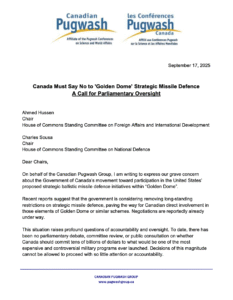
The ND4 are four prominent Canadian nuclear weapons abolition groups: Canadian Pugwash Group, Canadian Leadership for Nuclear Disarmament, Project Ploughshares, and Canadian Network to Abolish Nuclear Weapons.
November. 18, 2025
The Right Honourable Mark Carney
Prime Minister
House of Commons
Ottawa, Canada
Dear Prime Minister Carney,
RE: Appeal for Action toward Nuclear Abolition
We are a group of nineteen Canadian NGOs active in the field of international security and disarmament. Having just concluded a roundtable in Ottawa on October 23 under the title “Advancing Nuclear Disarmament in a Chaotic World”, we wanted to share with your government some of the prominent themes and proposals for action that emerged from the discussion.
No one would dispute that we are experiencing a turbulent time in international affairs with long standing norms for responsible state behaviour being eroded and, in some cases, openly flouted. A dangerous arms race dynamic is underway amongst rival powers and the norm of nuclear non-proliferation is under great stress. The proponents of nuclear weapons are ascendent and the supporters of nuclear restraint and disarmament are struggling to have their voice heard.
It is all the more crucial therefore during this period of great power competition for middle powers such as Canada to exert a moderating influence and work to reinforce the multilateral system and the rule of law. The following are a few proposals for Canada to consider championing as we collectively navigate the treacherous waters ahead.
A key near term goal is to help ensure a successful eleventh review conference of the Nuclear Non-proliferation Treaty (NPT) which will be held in April/May of next year. The NPT has often been described as the “cornerstone” of the global nuclear non-proliferation and disarmament regime. After two consecutive review conferences have failed to agree outcome documents (2015 and 2022) much is at stake for demonstrating a significant collective result from the gathering next spring. Canada in concert with the Nuclear Non-proliferation and Disarmament Initiative (NPDI), a grouping of non-nuclear weapon states, has pressed for an enhanced transparency and accountability procedure to be applied to the nuclear weapon states’ obligation to nuclear disarmament under Article VI of the treaty. The five nuclear weapon states have consistently ignored this proposal. The vast majority of NPT members cannot allow their rightful demand for accountability to be brushed aside again. We suggest that Canada in concert with like-minded states make acceptance of the transparency and accountability plan a sine qua non for agreeing to any outcome document from the review conference.
Within NATO we would encourage the government to promote the adoption by the Alliance of a “No First Use” doctrine. Such a policy adjustment would sharply restrict any consideration of use of nuclear weapons if the Alliance was attacked. Given its massive conventional military superiority NATO must avoid threatening a nuclear response to non-nuclear attacks against its members. By curtailing the scope of its nuclear deterrent, the Alliance would be fulfilling the NPT obligation from the 2000 review conference to reduce the saliency of nuclear weapons in security policies and help stem the pressure on the crucial norm of nuclear non-proliferation that current actions (e.g. Russia’s aggression against Ukraine) have created.
A treaty covering the fissile material essential for nuclear weapons has been an agreed objective of the international community for decades, but to date no actual negotiations have been initiated. This has been a result of the treaty being traditionally assigned to the 65 nation Conference on Disarmament in Geneva. The CD however is a moribund forum not having been able to agree and implement a program of work for over a quarter of a century. Canada has had a proud history as a leader in the effort to conclude a treaty banning the production of fissile material for nuclear weapons. It is time however for Canada alongside other friends of the treaty to delink this negotiation from the CD and seek to authorize the commencement of negotiations via a resolution of the UN General Assembly that would not be subject to a veto.
President Trump in January of this year announced an ambitious “Golden Dome” project that would ostensibly protect the United States from all types of missiles from all corners of the globe. In our view, “Golden Dome” in its strategic ballistic missile defence aspect is a seriously problematic proposal. On the grounds of feasibility, effectiveness, cost and the risk of incentivizing a nuclear arms race the scheme should be dismissed. Moreover, its planned deployment of space-based interceptors would also obliterate the non-weaponization of outer space a long-standing position of successive Canadian governments. We urge the government to continue only with the existing plans for NORAD modernization in cooperation with the United States and stay well clear of the more fanciful aspects of the project which would represent a financial “black hole” for our limited defence resources.
Finally, we would like to encourage the government to remain active in efforts to reform the UN’s disarmament machinery. The abuse of the consensus rule has led to the wishes of the vast majority of member states being stymied by the opposition of a few. The trend of the General Assembly to adopt ever more declaratory resolutions, despite their repetitive nature, rather than authorize relevant action needs to be curbed. We applaud the calls for reform contained in the Canadian statement to UNGA’s First Committee on Disarmament and International Security and offer the government our support in carrying these reform efforts forward.
We convey the above suggestions for priority action as part of Canada’s foreign and security policy with respect and in anticipation of receiving your reaction to them. We remain at the disposal of your ministers and officials for further discussion of these ideas.
Sincerely yours,
Earl Turcotte, Chairperson, Canadian Network to Abolish Nuclear Weapons (a group of 18 national and regional organizations)
Cesar Jaramillo, Chairperson, Canadian Pugwash Group
Alex Neve O.C., Chairperson, Canadian Leadership for Nuclear Disarmament
Branka Marijan, Interim Executive Director, Project Ploughshares

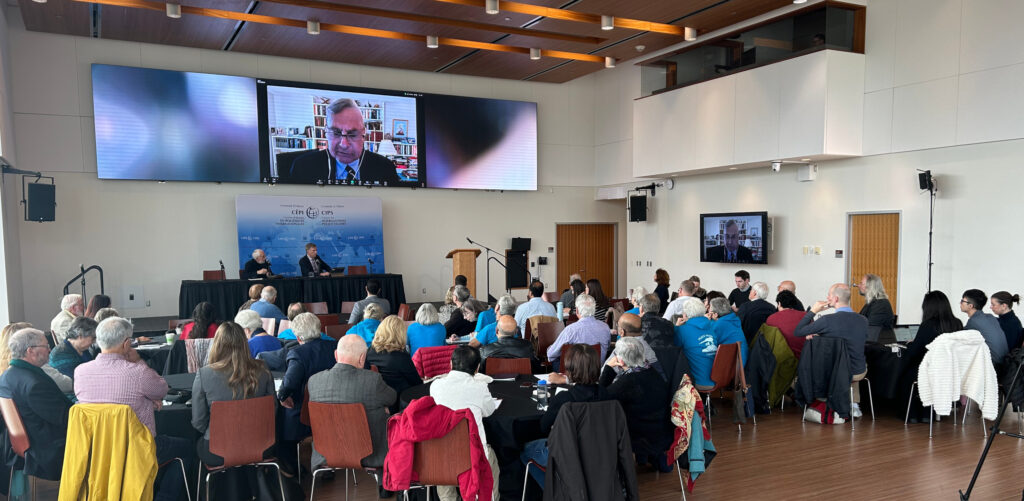
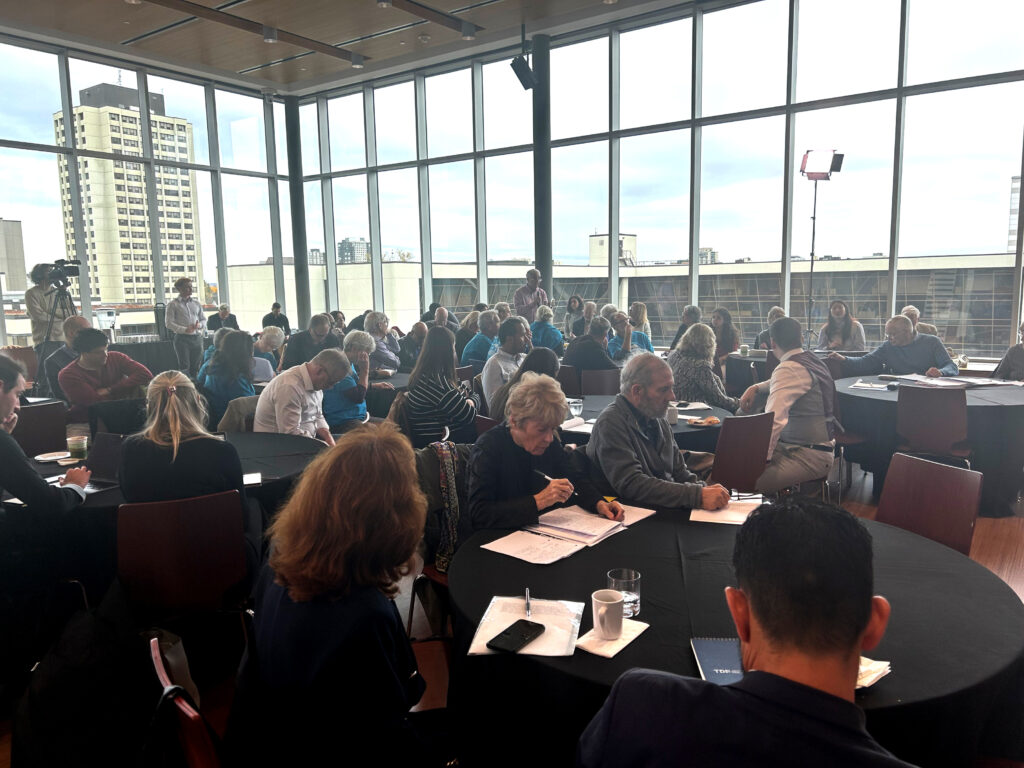
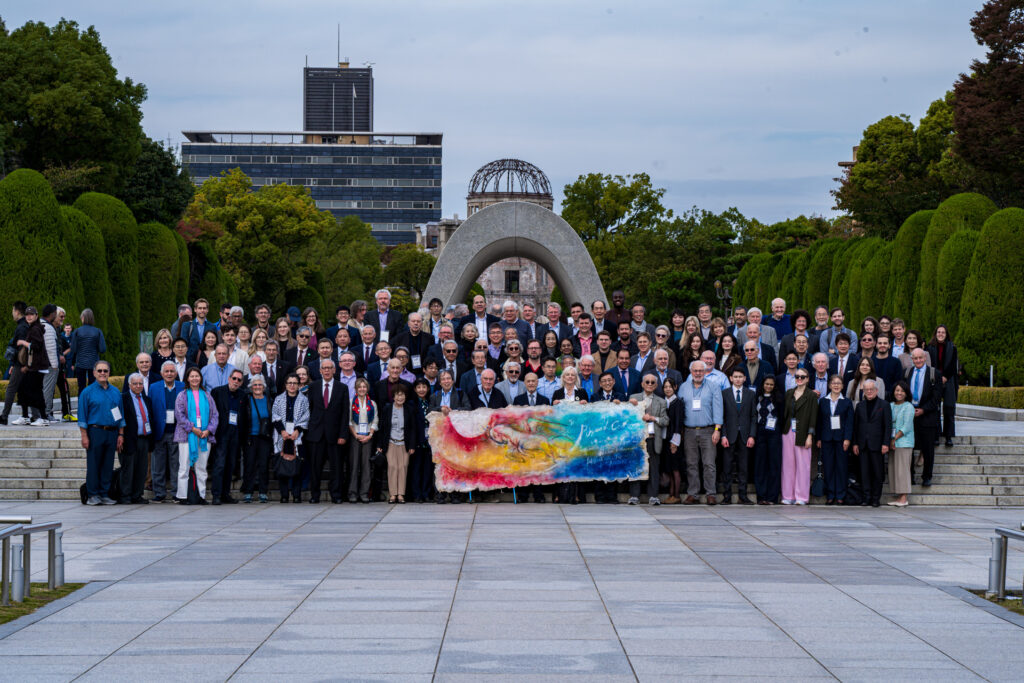
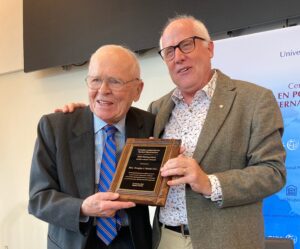 Photo (at left) of presentation of award by Alex Neve O.C., Chairperson, Canadian Leadership for Nuclear Disarmament to the Hon. Douglas J. Roche O.C. on October 23, 2025.
Photo (at left) of presentation of award by Alex Neve O.C., Chairperson, Canadian Leadership for Nuclear Disarmament to the Hon. Douglas J. Roche O.C. on October 23, 2025.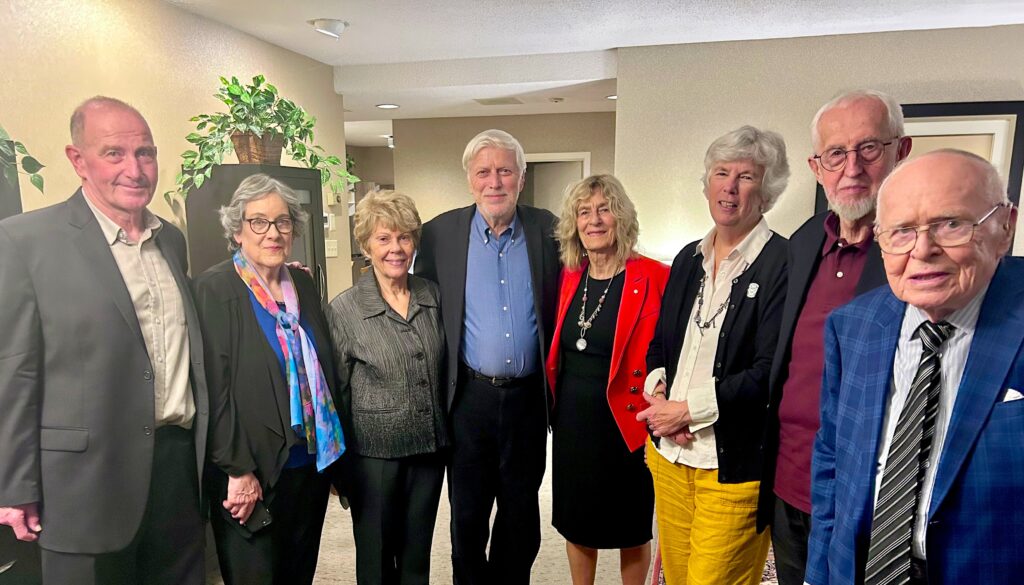
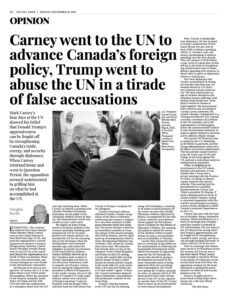 The author is a member and past Chair of Canadian Pugwash Group
The author is a member and past Chair of Canadian Pugwash Group